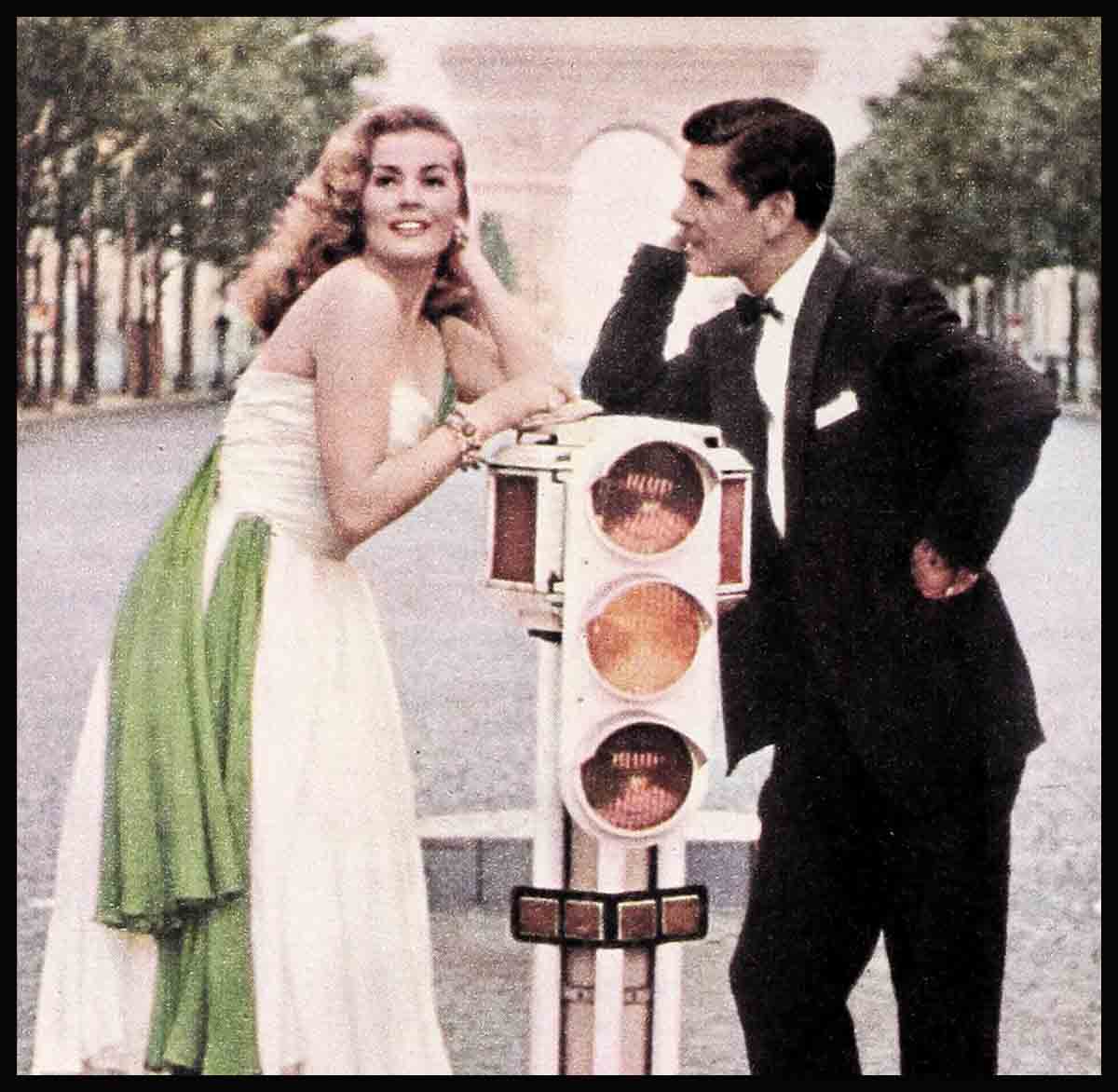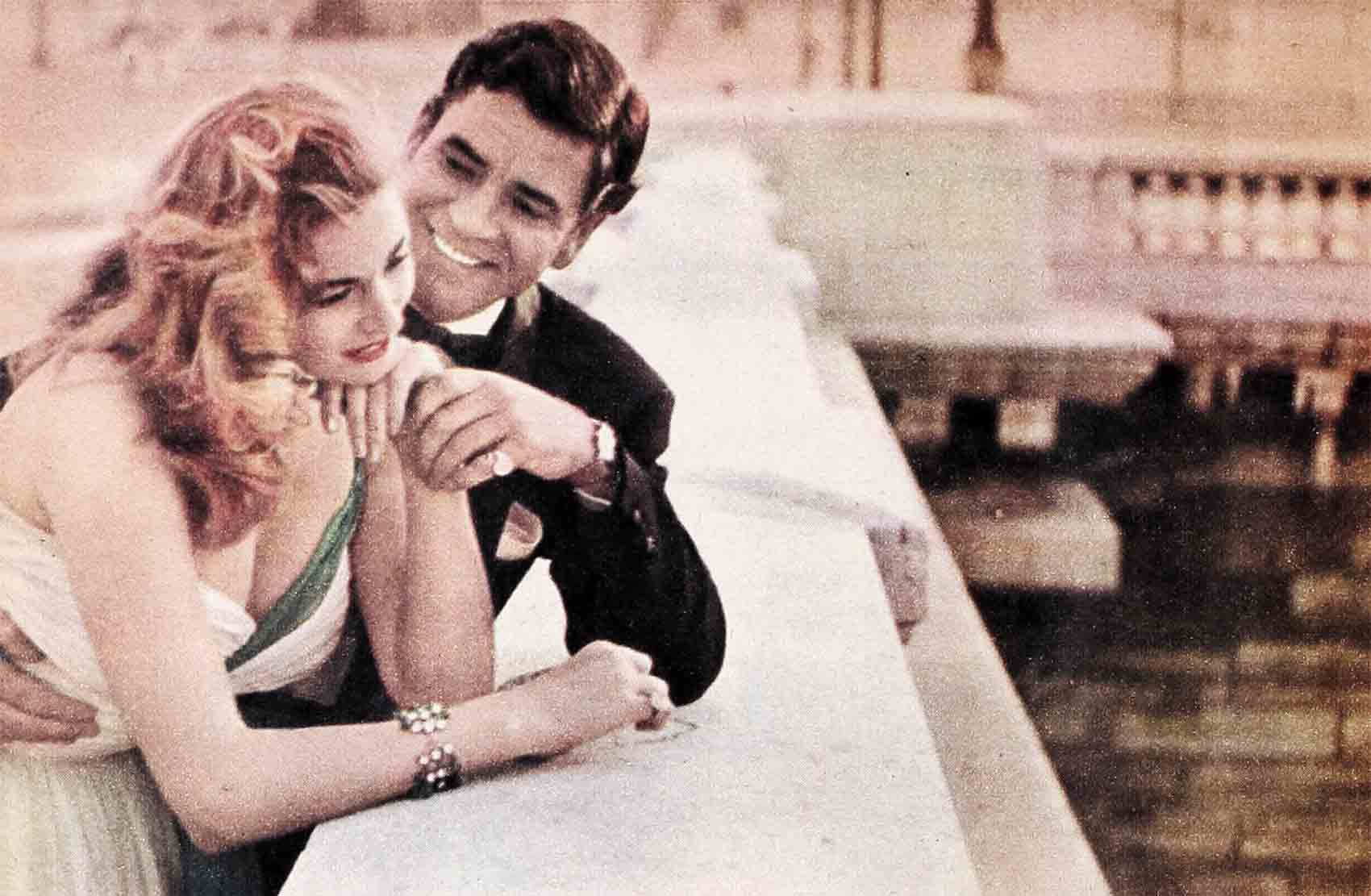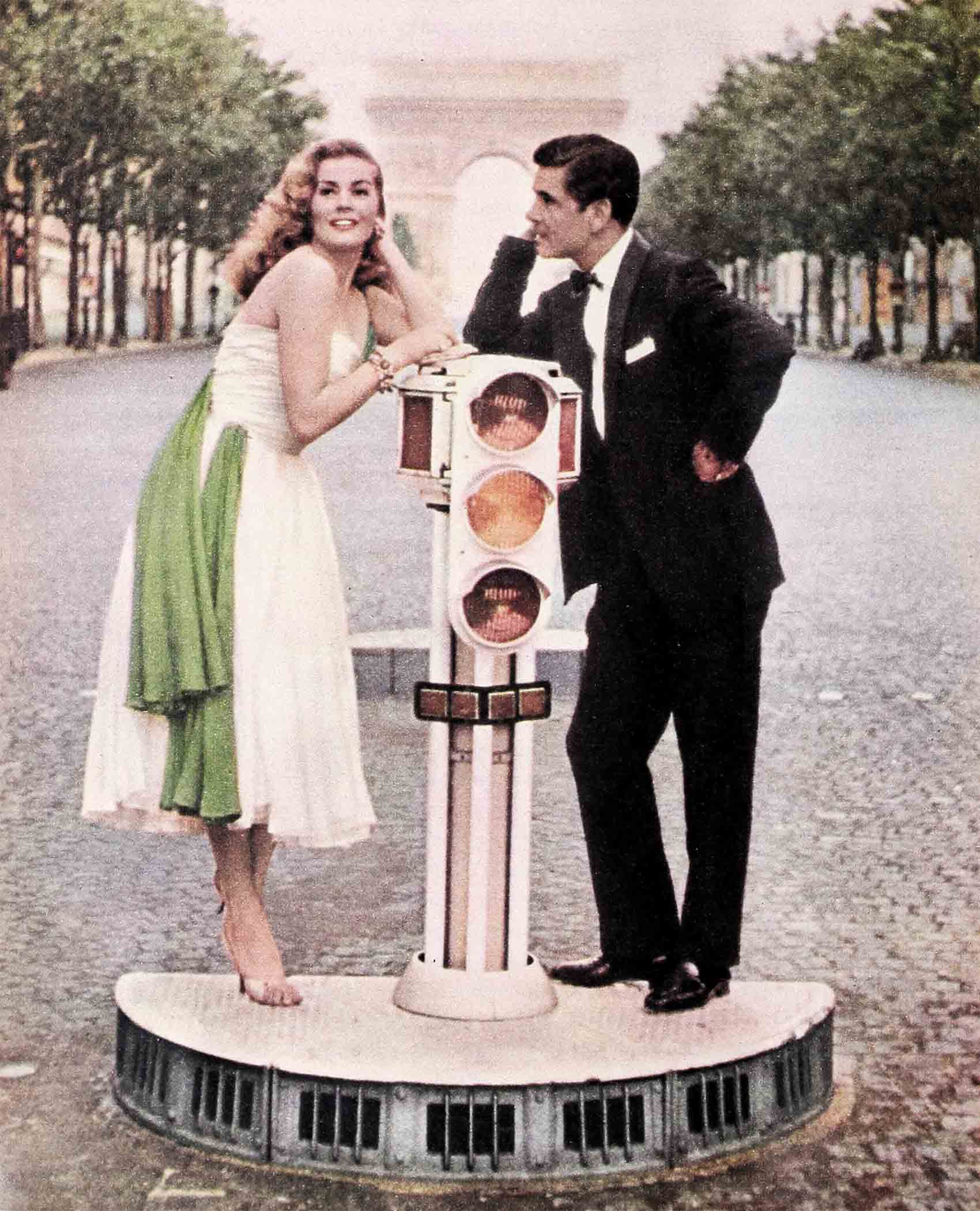
Danger Signals In Love—Anita Ekberg & Anthony Steel
STOP When Anita Ekberg walked into a room, all heads turned in her direction. The men saw a magnificent creature in a clinging, low-cut gown, a statuesque ideal of womanhood, and sighed appreciatively. All except Anita’s husband, Anthony Steel. He saw red . . .
CAUTION It seemed like a good idea when Tony neglected his career to be with her. He was a big success in British films, she was just a newcomer. But as her star rose, Tony’s languished. He said he had no regrets. But could he really mean it? Or would the cost of loving be too high?
GO They left the crowds, and stares, and screaming headlines when they stole away to a small deserted cafe. There, holding hands over a candlelit table, they could lose themselves in the lovely magic of the Paris night and forget all their troubles, for a while. . .
Few gave Anita and Tony good odds on their marriage succeeding. Recently, Anita smiled at the memories of her tempestuous marriage, that, headline for headline, has had as much newspaper space as a sputnik.
“Danger signals in love?” she laughed. “I know all about them now. Maybe I don’t know all the answers, but I can tell you one thing: They’ve made a big difference in my life. I’ve changed since my marriage.”
In the salon of their hotel suite, Anita was resting after a day’s busy schedule. Resting and talking, while Tony, who had days before got an accurate count on the roses in the wallpaper, silently contemplated his suede shoes—and, perhaps, his future.
It was late afternoon in Paris, where it’s great to be gorgeous, and no fun at all to be demure.
Anita, coolly gorgeous and almost demure in a dotted swiss frock, pursed her lips and sent a silent kiss across the room to her husband, Anthony Steel. “I’ve grown up; I’ve become more mature and certainly less selfish, than I was. Haven’t I, Tony?”
Tony smiled. La Ekberg has changed.
Because Tony is violently opposed to his wife’s posing for cheesecake, Anita announced immediately after their marriage that she was finished displaying her well-stacked figure at the pop of a flash-bulb. She has made motions in this direction, too, with the result that on her last arrival in New York, her picture—in an almost conservative dress—wound up on page twenty-nine of a leading afternoon paper.

Now Anita is accustomed to page one treatment. The girl who shocked London by literally busting out of her dress at a New Year’s shindig in the staid Berkeley Hotel; whose ooh-la-la pictures warmed up a debate in Britain’s usually-chilly House of Lords; whose pin-ups were barred at Oxford—this is a girl who seems unlikely to take page twenty-nine lying down—or covered up. In spite of Tony’s often-expressed feelings in the matter, news photographers are giving odds that on Anita’s next arrival in New York, she’ll be the old Ekberg, willing and eager to display her 39-22-36 measurements. The temptation to disregard the red light of Tony’s disapproval might prove to be too much for her.
And how will the “old” Ekberg affect Tony, who was reared in the English tradition that the man is the boss of the family? Will their marriage founder on a mere inch or two less of yard goods?
Already Tony’s male ego has taken quite a beating at the hands of the Swedish import.
Handsome, debonair, and with a devastating physique of his own, Tony Steel was one of the top ten actors at the British box-office when he and Anita teamed up romantically in 1956, he, too, accustomed to acclaim, No matter how much he may adore the sensational Anita, it must be hard for him to stand idly by while his wife acknowledges the ooh’s and aah’s that once were his.
“It’s wonderful being married to Anita,” he said, after their Ringling-Brothers-type marriage in Italy two years ago. But even then he was beginning to get the message. “I’m glad the wedding is over,” he sighed. “I’m exhausted.”
Some months later, when Anita had zipped off solo from a South American film festival—both denied later that he had struck her—he modified his original statement considerably. “I love my wife very much,” he said then, “but it’s no fun being married to a glamour girl.”
Of course, as Tony would be the first to admit, there’s more to marriage than fun? But still . . .

When he and Anita tied the knot on May 22, 1956, Tony did what a lot of other guys would have been happy to do—he put his own booming career into cold storage and followed his bride to Hollywood. He gave up his Rank contract, which had three more years to run; he antagonized British producers by declaring that he preferred to live and work in Hollywood; alienated his fans by announcing that he wanted to become an American citizen, as Anita was planning to do.
“I would have done anything for Anita,” he said, on one of those many afternoons in Paris when he counted the roses in the wallpaper while his wife was at work. “After all, I was a veteran, but her career was just starting.”
The man who was one of Britain’s brightest stars at the time could not, by the wildest stretch of the imagination, have foreseen that two years later his career would still be in the deep freeze; that in that time he would have made exactly two pictures; that he would be spending his time as “a sort of private bodyguard”—his phrase—to his bride.
He did his best to keep the regret out of his voice as he talked about it, but it’s evident that he’s sorry for his hasty action. Playing second-fiddle to his wife is not Steel’s dish of tea and his idleness has preyed on his mind until it has become an obsession.
“A man must work to keep his wife’s and his neighbors’ respect,” he said.
Counting wallpaper roses scarcely comes under the heading of work, and neither do the slugging matches which have been Tony’s only claim to fame since his marriage. The wolves who, he felt, weren’t showing the proper respect for his bride have learned the hard way that Steel has muscles to match his name. The untactful who have addressed him as “Mr. Ekberg” have lived—but only to regret it. At least one of his performances—his battle in Palm Beach a year ago with a sculptor who was displaying a nude statue of the luscious Anita—was top-notch, but it won him no award for acting—and no Yankee dollars.
But fortunately for Tony, his career has taken an upward turn with a good role in 20th’s “Harry Black,” and this may solve the problem.
Danger Signal No. 1 in many a marriage is that ole debbil, vanity, but not to Anita. One of the changes marriage has made in her, she says, is that, where once she was pleased and flattered at these often-extravagant attentions of the other sex, now “I’m annoyed when they try to flirt with me . . . I have eyes only for Tony. No man is as handsome and interesting.”
But what girl wouldn’t enjoy being fought over? Anita entered into the Palm Beach fracas shouting, “Let them fight! My husband’s winning!” even while she was clobbering his opponent with her high-heeled slippers.
Anita knew only a few words of English, such as “yes,” “no,” and “mink,” when she arrived in the United States as Miss Sweden in 1951. But she quickly enlarged her vocabulary and has seldom since been at a loss for words.
It was only two years later, in 1953, that she was giving out with such quips as: “I want a man who is very handsome, beeg and strong and he must have all sorts of money. Vat goot is a man wid’ out money? Effery girl wants a man to buy her pretty things like Jaguar cars and mink coats, diamonds.”
Not that the oval-shaped platinum dinner ring encrusted with forty-eight diamonds which Tony gave her on her last birthday came from Woolworth’s, but still . . . it’s only one gift.
“I’ve changed my ideas about the future, too,” she says now. “I was very ambitious about my career. I still am, but in a different way. Before, I wanted to succeed, and that was the driving force of my life. Now my career has become secondary. If it ever became an obstacle to our happiness together, or if for some reason or other Tony wanted me to give it up, I’d do it in a minute. After all,” she added, “you can’t cuddle a career.”
Like all the other actresses who have given out with this sort of statement, Anita probably meant it, at least for the moment. For the long pull will she heed the “caution” sign? Well, here’s what one person who claims to know her well says: “Anita is not clever, and certainly not intelligent, but she’s remarkably shrewd about herself and her career. She knows exactly where she’s going, and how she’s going to get there.”
What Anita might do if Tony asked her to give up her career may become an issue between them eventually, but as of now it is not. Tony laid it on the line: “I am not yet in a position to ask Anita to abandon her career, and in any case, I don’t think I would at this time. She wants to prove that she can become a serious actress.”
“I want to act,” Anita put it, “not be just a tool and a part of the decoration. I want to prove to myself that I can do better than I have in the past.”
Gird Oswald, who directed her in both of her latest films, United Artists’ “Paris Holiday” and Columbia’s “Screaming Mimi,” is on her team. “She could become a real actress if she were given the right parts,” he says. And Bob Hope, who stars in “Paris Holiday” and who started her on the road to fame, agrees, though with a little less enthusiasm than when he discusses the Ekberg brand of sex appeal.
So Tony, who had said earlier that he would do anything for her, is helping his glamorous wife achieve her new goal. He advises her on her contracts and often on her roles. He coaches her in her lines and helps her with her English.
The Steels, Mr. and Mrs., have a hefty quota of the ingredients which show up regularly in divorce courts unless the stop signals are watched. They have a tremendous career problem. They have jealousy, on her side as well as his. They have Tony’s vehement dislike of the flamboyance which gave Anita her start.
But smart Anita has already learned to cope with many a minor stop sign that could lead to trouble. “A wife should give in to her husband,” she says, as she hangs up her clothes. “When I was on my own, if I wanted to leave my clothes lying around in a mess, I didn’t inconvenience anyone except myself. But now that I’m married, and to such a tidy person (Tony was in the Grenadier Guards), I’m careful to put my clothes away the minute I take them off!”
Tony has also won out in the battle-of-the-sauces. Anita, who likes nothing about housekeeping except cooking, is a sauce specialist. “But Tony is a steak-and-potatoes man,” she sighs. “He doesn’t like complicated dishes with sauces. The last time I made one, he kidded, ‘Do you have to use Madeira wine in everything?’ ” Kidding or not, Ekberg hasn’t made a sauce since.
Of course, the two do have things in common. Both are European born and bred, with European ideas about love and marriage. “Don’t forget,” Tony says, “that Anita is Swedish and that she was raised in a middle-class Swedish home, where the family is considered sacred, and marriage is nothing to be trifled with.”
“She’s like those other Swedish actresses,” chortle the Hollywood wolves, who have never given up the idea that La Ekberg will soon be back in circulation, complete with low-cut gowns.
Both love to travel. Both are excellent swimmers and dream of the day when they can buy a home in Hollywood with a huge swimming pool. “A home,” Anita says, “to last all our lives, for us and our family.” (She denies vigorously that she ever said she didn’t want children. “We want a family, and we are going to have one, but before I concentrate on a family, I want to prove to myself that I can improve my career, that I can make a name as an actress. I believe in doing one thing at a time.”)
Both, fortunately, come to life at night In Paris, after Anita had finished her day’s work Tony and she would dine together by candlelight on the deserted roof garden Os their hotel, with fabulous Paris at their feet.
At such times, their love would flame its brightest. But later the sudden sharp breeze of a temper would sometimes extinguish it. For violent tempers are another of the things that the Steels, Tony and Anita, have in common.
The smoldering blonde can be warm, friendly and generous, as those who have worked with her will testify. She can also be—and often is—temperamental and inclined to fly into sudden rages, like a spoiled child.
When she saw Martha Hyer, co-star in “Paris Holiday,” wearing a purple dress, she screamed, “That’s my color,” almost crying in her rage.
“I’m stubborn as a mule,” she says, “and I can even be mean in my determination to have my own way. But prove it to me in black and white that I’m wrong, and I’ll admit it and apologize immediately.” (She didn’t mention purple.)
Tony’s boiling point is not so low. “We both have hot tempers,” Anita adds, “but I get mad first and more easily than Tony. After all, he’s British. But it doesn’t take him long to coax me out of a bad mood.”
“He’s so sweet and patient with her,” says a mutual friend. “Considerate and helpful and understanding. I’ve never heard him say a nasty word to her, even in their most violent quarrels. He never imposes his will on her; yet, believe me, he’s the head of the family.”
Anita echoed this as she sat, in her almost demure dotted swiss, in their hotel suite in Paris. “A wife should give in to her husband,” she said. And it’s funny. She did mean it.
THE END
It is a quote. PHOTOPLAY MAGAZINE JUNE 1958





No Comments